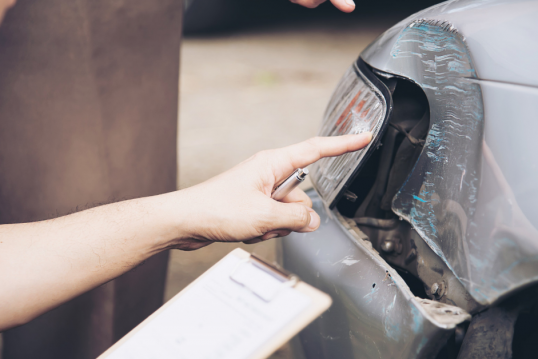Insurance companies like to present themselves as a safety net, but their priority is keeping payouts as low as possible. For Henderson car accident victims, that usually means running into tactics like lowball settlement offers or delays designed to wear you down. When you’re hurt and bills are piling up, that kind of pressure can make it tempting to accept less than you deserve.
That’s why it’s important to know how to approach negotiations with an insurance company after a car accident. With the right preparation and strategy, you can push back against unfair treatment and work toward a settlement that actually reflects your losses.
At the Cottle Firm, our dedicated Henderson car accident lawyers guide our clients through each step of the personal injury claim process, including negotiating with insurance companies. If you’ve recently been injured in a Henderson car crash, we’re prepared to help you fight for the financial compensation you need and deserve. Give us a call today at 702-722-6111 to discuss your case in a free consultation.
The Role of Insurance Companies
Shortly following a car accident in Henderson, you will likely receive a call from an insurance adjuster. Their job is to investigate the crash, review your claim, and make a decision on payment. However, it’s important to remember who they work for. Insurance companies are businesses, and like any business, their priority is protecting their bottom line and maximizing the company’s profits. The less they pay out in claims, the more profit they keep.
That doesn’t mean an adjuster will be openly hostile or aggressive. In fact, most take a friendly, sympathetic tone. But behind that demeanor is a trained professional who knows how to ask questions in ways that could reduce the value of your claim. For example, if you casually downplay your pain on a recorded call, that statement could be used to argue that your injuries aren’t serious.
Understanding this dynamic is important for settlement negotiations. When you realize that the adjuster isn’t your ally, you’ll be more careful with what you say, more deliberate about providing documentation, and more confident in pushing back against an unfair offer.
Nevada Laws and Insurance Rules that Affect Negotiations
Nevada law plays a big part in how negotiations with the insurance company might play out. The state’s rules on liability, coverage, and deadlines can affect the size of a potential settlement and the tactics an insurer might use against you.
Nevada’s Fault-Based Insurance System
Nevada is a fault state, which means the driver who causes the accident (and their insurer) must cover the damages. You have the right to file a claim directly against the at-fault driver’s insurer instead of relying only on your own coverage.
Because fault determines who pays, insurance adjusters spend a lot of energy trying to argue that you share responsibility. The more blame they can shift onto you, the less money they’ll have to pay.
Minimum Liability Coverage Requirements
Drivers in Nevada are required to carry at least:
- $25,000 for injuries to one person
- $50,000 total for injuries per accident
- $20,000 for property damage
These limits are better than nothing, but in a serious crash they don’t go very far. If the at-fualt driver only carries the bare minimum, you may need to consider a lawsuit to cover the rest of your losses.
Comparative Negligence in Nevada
Nevada uses a modified comparative negligence rule. This means if you’re partly at fault, your compensation is reduced by our share of the blame. For example, if your damages total $100,000 but you’re found 20% responsible, your payout would drop to $80,000. And if you’re more than 50% at fault, you lose your right to seek financial compensation.
Insurance adjusters know this and often try to exaggerate your role in the crash to reduce your payout. This is why strong evidence like photos and medical records is necessary to strengthen your claim and show who was truly at fault for your accident.
Deadlines and Statute of Limitations
You also need to keep an eye on the clock. In Nevada, you usually have two years from the date of the accident to file a personal injury claim. If you fail to file a claim within the Nevada statute of limitations, you’ll lose your right to compensation altogether. Insurance companies understand this and may drag their feet, hoping you’ll give up or run out of time. Act early and keep the statute of limitations in mind to give yourself the best chance of securing compensation.
Preparing to Negotiate with the Insurance Company
Negotiating with an insurance company isn’t something you want to jump into unprepared. The adjuster has experience and training on their side, and their job is to save the company money. The best way to level the playing field is to go in organized, with the right evidence, clear documentation, and a realistic idea of what your claim is worth.
Gathering Evidence
Start by collecting everything you can that relates to the crash. That includes the SR-1 report of the traffic accident, medical records, hospital bills, and receipts for out-of-pocket expenses. Photos and videos from the accident scene can also help establish what happened. Witness statements can also be used as evidence if the insurer tries to dispute fault.
Keeping a Recovery Journal
Insurance companies often focus only on hard costs, like medical bills and repair costs. But an accident can also affect your life in ways that don’t show up on a spreadsheet. Keep a journal of your symptoms, doctor visits, missed work, and daily limitations to provide a fuller picture of how the accident has affected you.
Understanding the Full Value of Your Claim
Before you start negotiations, take time to calculate what your case is really worth. That means looking beyond the bills you’ve received so far. Future medical treatments, physical therapy, reduced earning capacity, and pain and suffering are all part of the equation. If you only focus on the immediate costs, you risk walking away with a settlement that doesn’t cover your long-term needs.
The Initial Contact with the Insurance Adjuster
Not long after a Henderson car accident, you’ll probably get a call from an insurance adjuster. This first conversation sets the tone for everything that follows, so it’s important to handle it carefully. Remember, the adjuster’s priority is to protect the insurance company, not you.
The adjuster will likely ask for basic details about the accident, your injuries, and any treatment you’ve received so far. They may also ask if you’ll provide a recorded statement. While it might seem harmless, this is often a way for them to lock you into comments that can later be used to minimize your claim.
Many accident victims make the mistake of agreeing to a recorded statement without realizing the risks. Even casual remarks, such as saying you’re “feeling better”, can be twisted to suggest your injuries aren’t serious. You’re not legally required to give a recorded statement, and in most cases, it’s best to politely decline until you’ve spoken with a lawyer.
Strategies for Effective Negotiation
Once the initial contact is out of the way, the real work of negotiating begins. Insurance companies are skilled at pushing for low settlements, but you don’t have to accept the first number they put on the table. With the right approach, you can strengthen your position and push back against tactics designed to undervalue your claim.
Be Patient
One of the most common mistakes accident victims make is jumping at the first offer. Adjusters often throw out a lowball settlement quickly, hoping you’ll take it before you realize the full extent of your injuries or expenses. Resist the urge to settle too soon. Give yourself time to finish medical treatment and fully understand your damages.
Back Up Your Claim with Documentation
Numbers carry more weight when they’re supported by evidence. Present copies of medical bills, repair estimates, pay stubs showing lost income,and any other documentation that proves your losses. The stronger your paper trail, the harder it is for the insurer to dismiss your claim as exaggerated.
Frame Your Counteroffer Clearly
When the first settlement offer comes in low, don’t just reject it outright: respond with a counteroffer backed by facts. Point out specific areas where their number falls short, such as ongoing medical treatment or reduced earning capacity. Explaining why their offer doesn’t reflect your true costs helps move the discussion toward a fairer settlement.
Stay Firm but Professional
Negotiations can be frustrating, but losing your cool only plays into the adjuster’s hands. Keep your communication polite, respectful, and focused on the facts. Showing that you’re confident and prepared sends the message that you won’t be easily pressured into settling for less than you deserve.
Common Insurance Company Tactics to Watch Out For
Insurance companies handle car accident claims every day, and they often use subtle tactics to minimize payouts. Being aware of these strategies can help you avoid common traps and stay in control of your negotiation.
Quick Settlement Offers
One of the most common tactics is offering a lowball settlement very early, sometimes before the victim has finished medical treatment. While a fast payout can be tempting, it often doesn’t cover the full extent of your injuries or future medical needs. Take your time to understand the true value of your claim before agreeing to anything.
Downplaying Injuries
Adjusters may argue that your injuries are minor or pre-existing in order to reduce your compensation. They might argue that your current condition is related to other medical issues or suggest that your injuries are exaggerated. Documenting every injury and treatment is the best defense against these tactics.
Delaying Responses
Sometimes, insurers will intentionally drag out communication to pressure you into accepting less. They know that waiting can be frustrating and financially stressful, and they may count on you settling just to get closure. Stay organized, keep deadlines in mind, and remain persistent to counteract this tactic.
Requesting Excessive Documentation
While it’s reasonable for an insurer to request proof of damages, some will push for unnecessary documents in an effort to slow the process or find ways to deny parts of your claim. Submit what’s required, keep copies for your records, and consult a lawyer if the requests become unreasonable.
Shifting Blame
Adjusters often try to argue that you share some responsibility for the accident to reduce the payout. Even small suggestions of fault can affect your compensation under Nevada’s comparative negligence rules. Having clear evidence helps protect your claim.
When Negotiations Stall or Become Difficult
Even with careful preparation and solid evidence, negotiations with an insurance company don’t always go smoothly. Here are some ways to respond if progress slows or the insurer seems unreasonable.
Writing a Demand Letter
If the insurer isn’t budging, a demand letter can be a useful next step. This letter should clearly lay out the facts of the accident, document your injuries and losses, and state the amount of compensation you’re seeking. A well-prepared demand letter signals that you’re serious and may motivate the insurer to reconsider their offer.
Recognizing Bad Faith Negotiation
Insurance companies are required to act in good faith, but not every adjuster follows this principle. Signs of bad faith include repeated delays, refusing to provide a clear explanation for a low offer, or ignoring evidence you’ve submitted. Recognizing these behaviors early can help you take steps to protect your rights.
Filing a Complaint with the Nevada Division of Insurance
The Nevada Division of Insurance oversees insurance companies in the state. If you believe an insurer is acting in bad faith or violating your rights, you can file a complaint. While this won’t guarantee a higher settlement, it can put additional pressure on the company to negotiate fairly.
Considering Litigation
Sometimes, the insurer simply refuses to offer a fair settlement. In those cases, taking legal action may be the only way to recover full compensation. Filing a lawsuit allows your case to be heard in court and gives your Henderson personal injury attorney leverage during negotiations, since insurers know going to trial can be costly.
Discuss Your Case With a Henderson Car Accident Lawyer
Having an experienced Henderson car accident lawyer on your side can make a big difference during settlement negotiations. At the Cottle Firm, our Henderson car accident lawyers understand how insurers operate, know how to calculate the full value of a claim, and can push back against lowball offers. We can handle communication with the insurance company and ensure nothing you say is used against you. Contact the Cottle Firm today at 702-722-6111 to learn more about your legal options and discuss your case in a free consultation.









